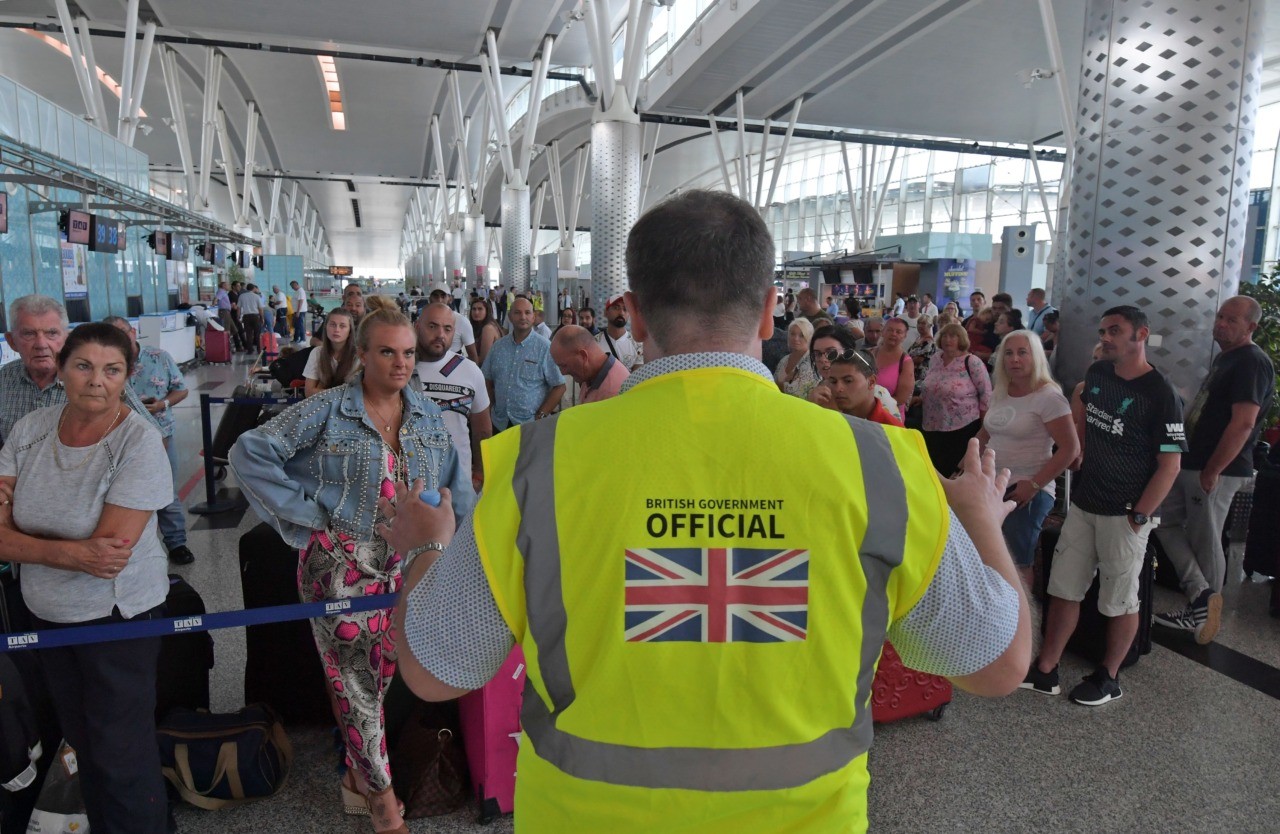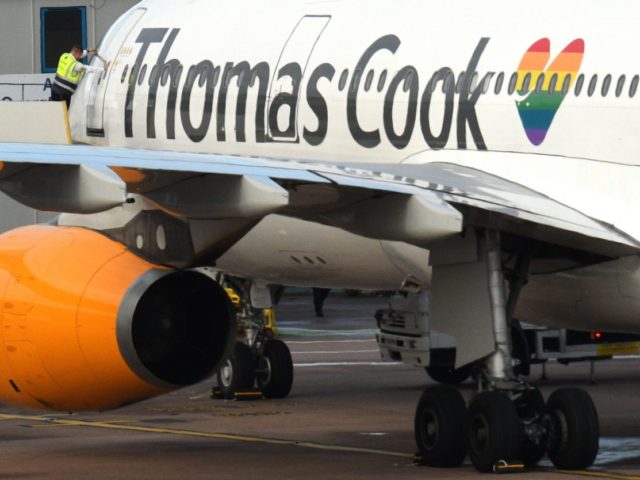Thomas Cook, the world’s oldest tour operator, collapsed in the early hours of Monday morning leaving hundreds of thousands of tourists unable to return home on their booked flights, leaving the government to repatriate travellers.
In total, some 650,000 customers of the multinational operator are presently abroad, 150,000 of them from the United Kingdom and 140,000 of the remainder are from Germany, an important market for the collapsed operator which at one time was majority-owned by German shareholders.
Early estimates of the cost of the repatriation mission, claimed to be the largest movement of civilians by the British government in peacetime, were reported by The Times to stand as high as £600 million, but the government insisted the cost would be £100 million. The enormous expense of bailing out the long-troubled business stands in contrast to Germany, where insurance companies are expected to bring back their own customers.

A British government official speaks to tourists, flying with Thomas Cook, as they queue at the Enfidha International airport on September 23, 2019, on the outskirts of Sousse south of the capital Tunis. – British travel group Thomas Cook on Monday declared bankruptcy after failing to reach a last-ditch rescue deal, triggering the UK’s biggest repatriation since World War II to bring back tens of thousands of stranded passengers. / FETHI BELAID/AFP/Getty Images
Under British travel rules established in the 1970s, those travelling on package holidays are covered under the ATOL insurance scheme, which is administered by the UK government’s Civil Aviation Authority. Although flight-only bookings with Thomas Cook — which reports indicate accounts for roughly half those impacted today — are not eligible for cover under the scheme, the government has already said those customers would be repatriated by the government flights, which may go some way to explain the significant projected cost to the taxpayer.
The Associated Press reports the problems for the veteran travel operator, which was established in 1841, began in the early 1990s with the proliferation of budget airlines in Europe introducing new competition, and the rise of the internet allowing tourists to book holidays directly and circumvent tour operators. Persistent terror attacks across Europe and further abroad which frequently targeted tourist hotspots and tourist resorts were blamed in 2017 for a downturn in fortunes for the company.
UK insolvency rules mean Thomas Cook’s 94 own aircraft which were due to bring back holidaymakers are banned from flying at all, meaning while they sit on the tarmac, the government has had to charter a fleet of aircraft from around the world — some reportedly being brought in from as far away as Malaysia — to bring British nationals home.
Thomas Cook — which already owes £1.7 billion to its creditors — had applied to the government for a £200 million bailout to keep it trading, which the government refused. UK Prime Minister Boris Johnson came under attack from the hard-left Labour Party for not stumping up the cash for Thomas Cook — which was once government-owned — but Johnson defended the move.
Explaining bailing out a failed company created a “moral hazard” for the future — in essence that it disincentivised other businesses from acting responsibly by implying there was a government safety net to bail them out of trouble — Johnson said: “We need to look at ways in which tour operators one way or another can protect themselves from such bankruptcies in future. One is driven to reflect on whether the directors of these companies are properly incentivised to sort such matters out.”
The comments have been reported to imply that there may even be government action against negligent company directors who allowed businesses to go bankrupt while enriching themselves. Thomas Cook’s single largest shareholder is China’s Fosun corporation.
Labour’s Rebecca Long-Bailey called the government’s refusal to bail out the company “barmy”, but laying out the extent of the debt faced by Thomas Cook minister Grant Shapps retorted Monday morning: “The company were asking for up to £250m, they needed about £900m on top of that and they have got debts of £1.7bn, so the idea of just spending taxpayers’ money on that just wasn’t really a goer.
“I think the problem of putting money into it, apart from the fact governments don’t usually go around investing in travel companies, is that it may have just stretched things out for a couple of weeks and we could have been exactly where we started.”

COMMENTS
Please let us know if you're having issues with commenting.